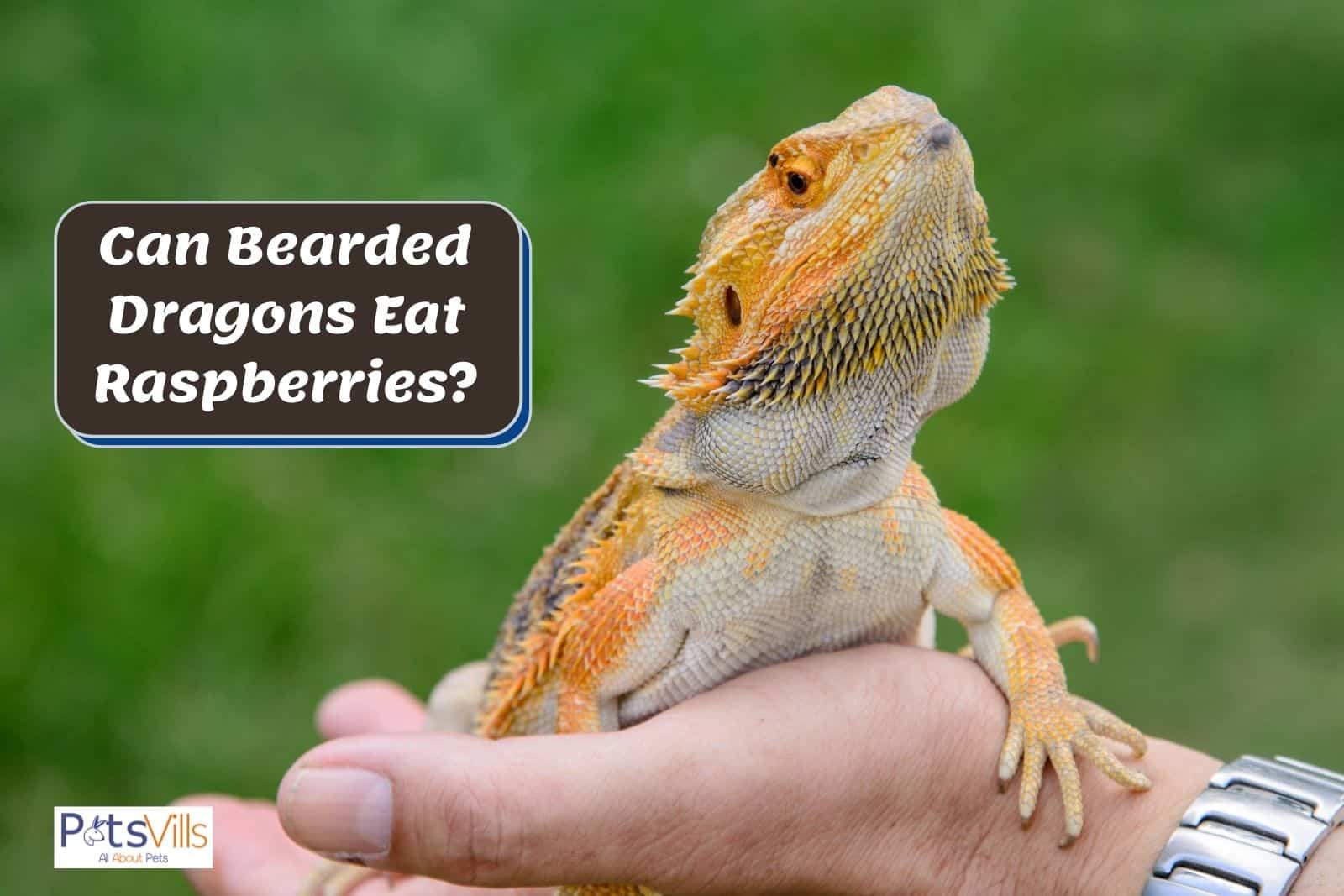You may have heard of beardies eating apples and other common fruits, but can bearded dragons have raspberries?
Bearded dragons make for unique and fascinating pets; however, when it comes to their diet, they require a specific and balanced nutritional plan.
Fresh fruit does not appear too often on the generally recommended beardie diet.
Still, there are benefits to including some fruits like raspberries as an occasional snack, so keep reading!
Don’t forget to check our bearded dragon feeding guide too!
Table of Contents
Can Bearded Dragons Have Raspberries?
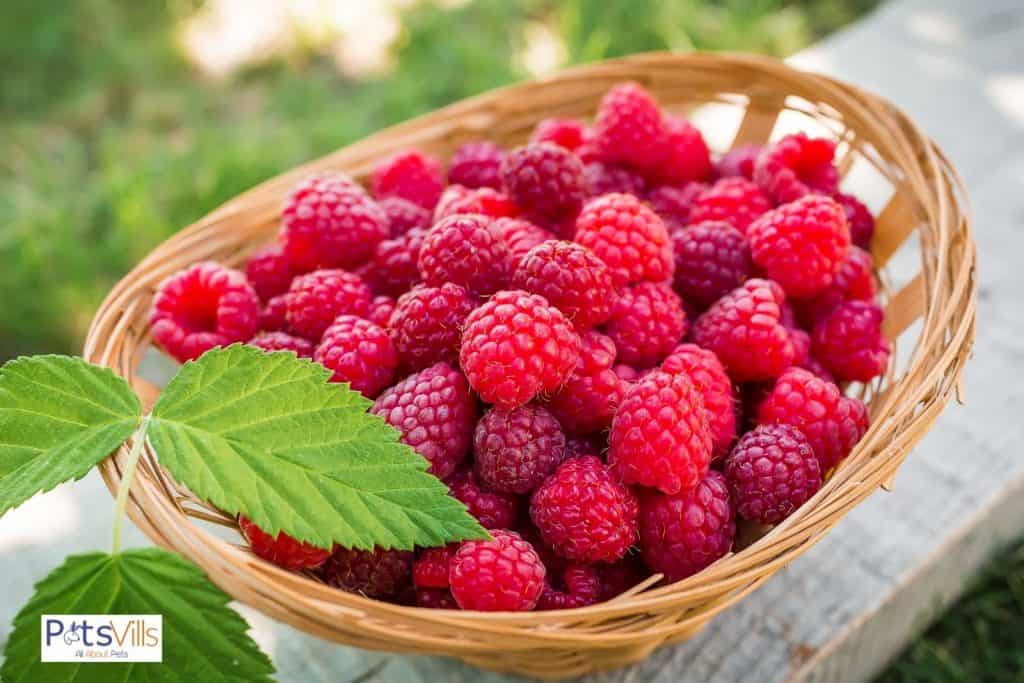
Beardies can eat raspberries, albeit in small and infrequent servings.
Bearded dragons love fruit and are known for having a sweet tooth.
In fact, the internet is awash with pictures of bearded dragons eating apples and people asking questions like, ‘do bearded dragons eat cantaloupe?’
So it comes as no surprise that one may be curious about whether a bearded dragon can have raspberries too.
Raspberries contain essential nutrients like vitamin K and vitamin E. However, there are safer fruits that you can implement as part of your bearded dragon’s regular diet.
Still, the occasional raspberry can help supplement their nutritional requirements.
Why Should My Bearded Dragon Not Eat Too Many Raspberries?
1. High Sugar Content
The main problem with most fruits, at least as far as bearded dragons are concerned, is their relatively high sugar level.
While that sugar comes in the form of the healthier fructose variety, it can still negatively impact your beardie’s health.
Too much sugar can cause tooth decay and create weight problems that can cause further health concerns down the line. It is also not good for your dragon’s digestion.
2. Incorrect calcium-to-phosphorus ratio
Raspberries have a touch more phosphorus than they do calcium, with a calcium-to-phosphorus ratio of 0.9:1.
This is not ideal because phosphorus binds with calcium and prevents its absorption in the bloodstream.
This can lead to a calcium deficiency and eventually to Metabolic Bone Disease for bearded dragons, a debilitating and potentially deadly disease. It can also cause renal issues and kidney stones.
3. Moderately high levels of oxalates
Raspberries also contain about 48 mg of oxalates or oxalic acid per cup. This is quite high. Like phosphorus, oxalates are dangerous because they bind with minerals like calcium and cause mineral deficiencies.
They also create kidney stones and renal troubles. Therefore, the amount of oxalic acid in your bearded dragon’s diet should always be closely monitored.
Can Bearded Dragons Eat Raspberries Leaves?
Like the fruit, beardies can safely eat raspberry leaves in moderation. The leaves of the raspberry tree act as a mineral concentrator.
More importantly, where beardies and other lizards are concerned, eating raspberry leaves helps regulate and lower blood sugar levels. The leaves are also high in bioflavonoids and antioxidants.
Bioflavonoids are a group of nutrients found pretty much anywhere you find vitamin C. There are over eight thousand different kinds of bioflavonoids. They are pigments that give plants, veggies, and fruits their color.
Often called ‘vitamin P,’ bioflavonoids don’t necessarily meet the criteria of ‘real’ vitamins.
That does not mean they aren’t highly beneficial nutrients. The discrepancy is because it has not yet been proven that all bioflavonoids are essential.
Still, your lizard friend stands to benefit from some of the many functions of bioflavonoids. Some are responsible for stabilizing cell membranes that release histamines.
Others help regulate bleeding and the rate at which wounds heal.
Some bioflavonoids even help prevent cancer. The effect is amplified by vitamin C, and that brings us to antioxidants.
Antioxidants are directly responsible for combatting free radicals. Free radicals are a natural part of many animals’ immune systems.
When functioning correctly, free radicals are very effective at attacking and destroying pathogens. However, because they are highly volatile, free radicals also attack just about anything else, including your healthy cells.
The problem is compounded by the fact that they can be produced and distributed exceptionally fast. When this happens, your bearded dragon could suffer oxidative stress. When this happens, even DNA can be damaged.
Cancer, diabetes, and various debilitating or fatal conditions are likely to follow. The best defense your beardy has against oxidative stress is antioxidants. These are compounds that disable free radicals.
Together, antioxidants and bioflavonoids reduce the risks of heart problems and certain cancers.
They also protect your scaly pal against infections, strengthen the walls of their blood vessels and improve blood circulation. Finally, they greatly improve liver function.
Can Bearded Dragons Eat Wild Raspberries?
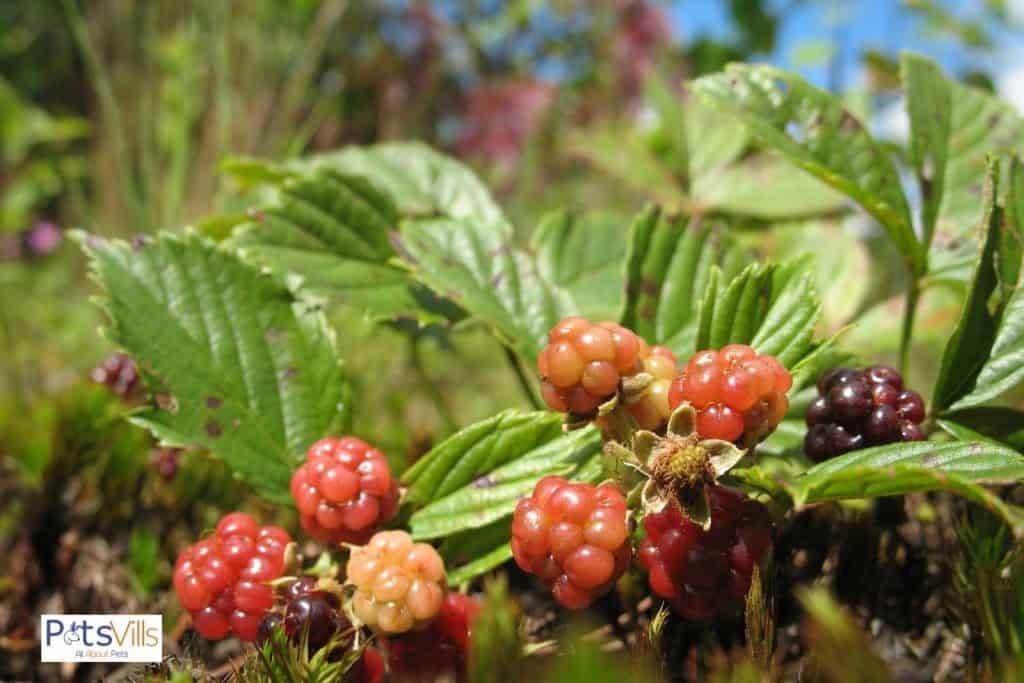
Yes, but wild raspberries aren’t ideal for bearded dragons.
The primary differences between raspberries and wild raspberries are the conditions in which they are grown.
Because wild raspberries have to contend with challenging growing conditions, they are generally smaller, containing fewer nutrients and less sugar.
While the latter may sound good, normal raspberries are still the better option for your bearded dragon.
The diminished nutritional benefit, along with lower fiber content, means that there is less reason to feed the wild variant to your dragon.
Quality food intake always wins out over quantity. It is also more difficult to determine the correct amount of wild raspberries to feed your pet. Therefore, they are best left in favor of the traditionally grown kind.
Can Bearded Dragons Eat Black Raspberries?
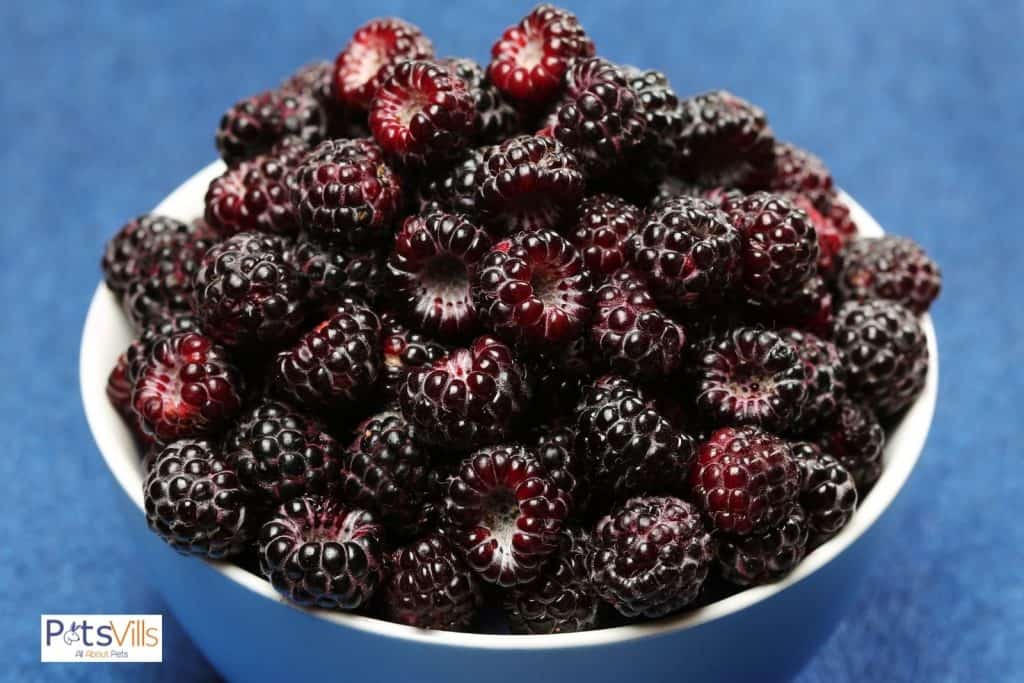
Yes, beardies can eat black raspberries. The only notable difference between black raspberries and red raspberries, aside from the taste, is that the black variant is higher in some antioxidants.
The decision may come down to which your dragon prefers. Any beardie parent will tell you that tastes vary from dragon to dragon.
Related: What Kind of Fruit Can Bearded Dragons Eat?
Benefits Of Raspberries for Bearded Dragons
Vitamin C
Raspberries are very high in vitamin C.
Although the microflora in a dragon’s kidneys produces vitamin C, they must supplement their intake. In nature, bearded dragons eat a diverse range of different foods to ensure they get all of the nutrients they need.
In captivity, they rely on being provided the foods that they need. Thanks to the vitamin C concentration in raspberries, a couple of bite-sized chunks of raspberries should be plenty to help keep your dragon healthy.
Vitamin C is important because of the wide range of functions it has in your beardie’s body.
We discussed antioxidants, and vitamin C is one of the best antioxidants in nature. In addition to its antioxidative power, vitamin C is vital to keep your bearded dragon’s bodily functions strong and healthy.
A vitamin C deficiency can lead to bruising, bleeding gums, separation and tearing of the skin, and occasionally diarrhea. If left untreated, scurvy (the extreme stages of vitamin C deficiency) can be fatal.
A Surprising Source of Fiber
For bearded dragons, a healthy diet consists largely of various plant matter and insects. It is a diet that offers plenty of fiber.
There are, however, many forms of fiber. The fiber found in raspberries is a welcome addition to your beardie’s diet, helping ensure the digestive health of your lizard friend.
A Source of Magnesium
Magnesium is a mineral that plays a role in hundreds of bodily functions.
Your bearded dragon requires magnesium to help its body regulate its heartbeat. It aids in maintaining a healthy immune system and is crucial for nerve and muscle health.
Magnesium helps stabilize blood sugar levels, aids in healthy bone development, and plays an important role in producing energy and protein.
How Many Raspberries Can We Feed to Bearded Dragons?
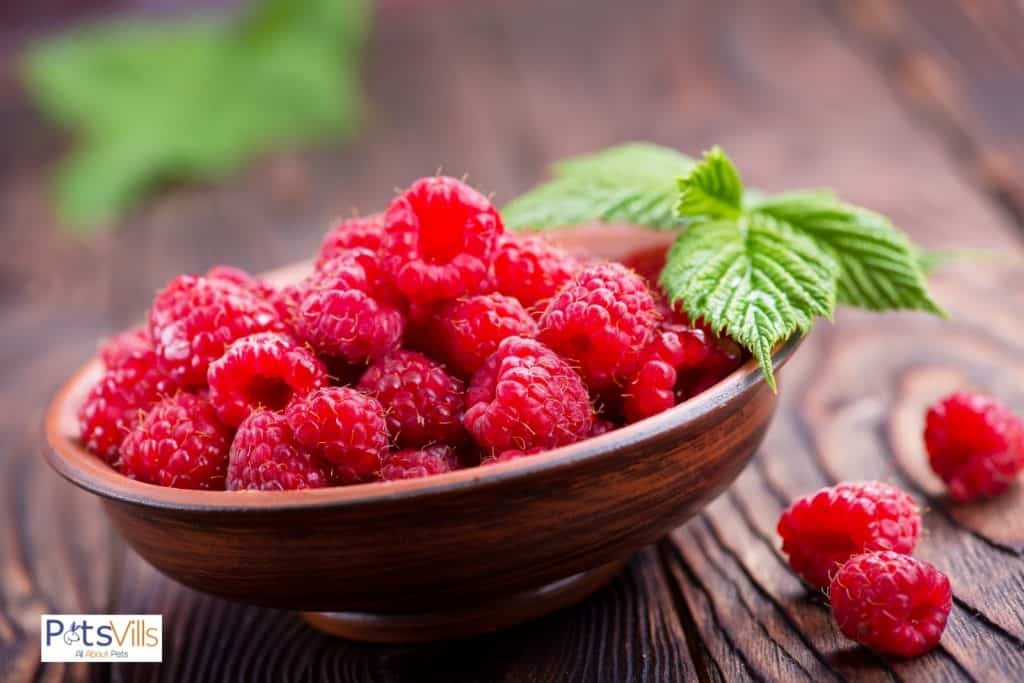
The answer depends on your bearded dragon. Juvenile Bearded dragons usually do not need to eat fruit, but a healthy adult should be able to eat about three raspberries every two weeks as a treat.
Frozen raspberries can be thawed and fed to your bearded dragon. But do not warm them up. Wash all raspberries beforehand and you can slice them into bite-sized chunks.
This can go on top of their normal salad. Be sure to remove any fruit that might go stale afterward. Remember, if you wouldn’t eat, don’t feed it to your dragon!
The exact serving size depends on your dragon as well, but on average, a single raspberry broken up into bite-sized pieces is more than enough.
To help you prepare your beardie’s diet, check our new e-book:
FAQs
Are berries safe for bearded dragons?
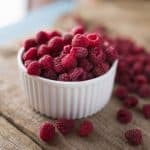
Many berries such as blueberries are safe for bearded dragons in small amounts, fed occasionally. Raspberries may not be true berries, but they fall under this category. Too many berries can be dangerous because of the high sugar content, the number of oxalates, and their high levels of phosphorus.
Can you feed a baby bearded dragon raspberries?
Juvenile bearded dragons should not eat raspberries. Baby bearded dragons have a very sensitive digestive system. Most of their diet should come from feeder insects, with the option of some appropriate leafy greens. Therefore, it is best to avoid all fruits, including raspberries, until at least twelve months of age.
Can bearded dragons eat raspberry seeds?
Yes, a bearded dragon can eat raspberry seeds. Because one only feeds a bearded dragon a small number of raspberries at a time, the seeds pose no health risks. They are too small to pose a health risk and are simply excreted by the body.
Conclusion
Bearded dragons raised in captivity need to have some of their nutritional requirements supplemented. Raspberries, no matter the color or variant, make a fantastic nutritional snack.
Among the plethora of fruit you could add to a bearded dragon diet, raspberries have one of the lowest sugar levels. This is important considering their low sugar requirements.
The nutritional content of raspberries makes it an excellent supplement for bearded dragons suffering from nutrient deficiencies, even when they are on a diet of the best bearded dragon food.
However, it should not be a part of your beardie’s daily diet. You should always consult your vet before introducing your bearded dragon to any new fruits.
References
- “Autonomic Control of the Pulmonary Surfactant System and Lung Compliance in the Lizard | Physiological Zoology: Vol 70, No 4.” 2015. Physiological Zoology. 2015. https://www.journals.uchicago.edu/doi/abs/10.1086/515847.
- Rowland, Mark. 2009. “Veterinary Care of Bearded Dragons.” In Practice 31 (10): 506–11. https://doi.org/10.1136/inpract.31.10.506.
- Stahl, Scott J. 1999. “General Husbandry and Captive Propagation of Bearded Dragons, Pogona Vitticeps.” Bulletin of the Association of Reptilian and Amphibian Veterinarians 9 (4): 12–17. https://doi.org/10.5818/1076-3139.9.4.12.
- WebMD Editorial Contributors. 2020. “Foods High in Oxalates.” WebMD. WebMD. November 4, 2020. https://www.webmd.com/diet/foods-high-in-oxalates#1.
- Wright, Kevin. 2008. “Two Common Disorders of Captive Bearded Dragons (Pogona Vitticeps): Nutritional Secondary Hyperparathyroidism and Constipation.” Journal of Exotic Pet Medicine 17 (4): 267–72. https://doi.org/10.1053/j.jepm.2008.07.004.
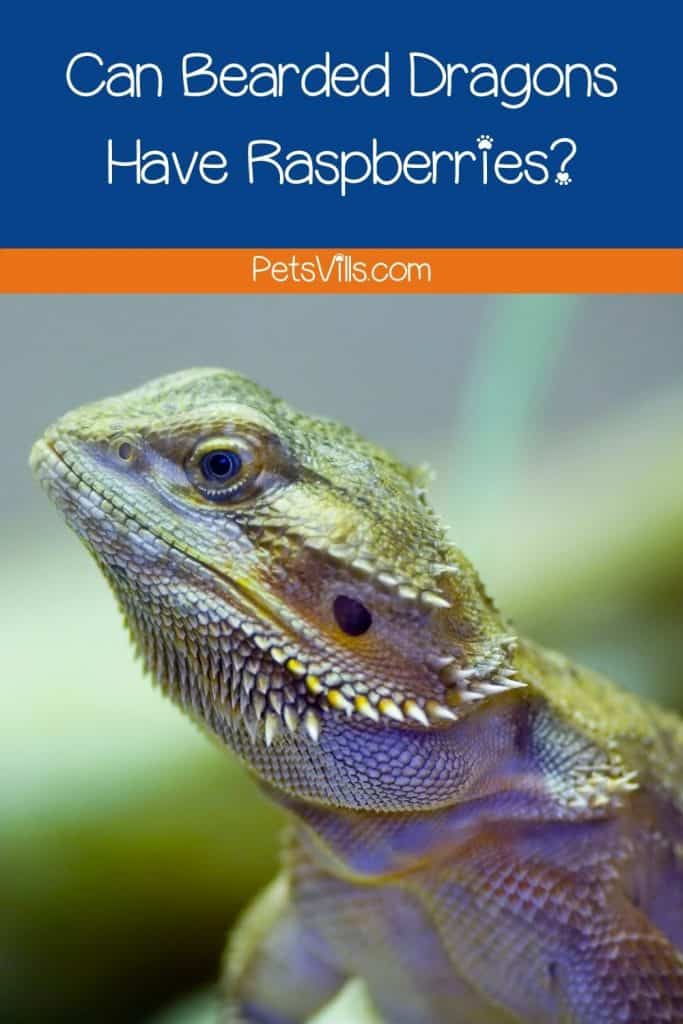
Can bearded dragons eat raspberries? What are your thoughts on this topic? Please share with us below!

